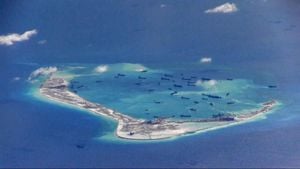Ngozi Okonjo-Iweala, the trailblazer who became the first woman and the first African to lead the World Trade Organization (WTO), has officially been reappointed for another term. This significant decision was announced on Friday, with the WTO confirming her second appointment as director-general. Starting September 1, 2025, Okonjo-Iweala will continue her mission at the helm of the esteemed global trade body.
"WTO members today agreed to give incumbent Ngozi Okonjo-Iweala a second term as director-general of the WTO," the organization stated proudly. Her initial term began in March 2021 and was marked by the challenges of the COVID-19 pandemic, trade disputes, and a push for equitable vaccine distribution globally.
Ambassador Petter Ølberg of Norway, who spearheaded the selection process, underscored the widespread recognition of Okonjo-Iweala’s exceptional leadership, highlighting her strategic vision for the WTO's future. "The decision reflects widespread recognition of her exceptional leadership and strategic vision for the future of the WTO," he stated at the press conference held at WTO headquarters in Geneva.
Though Okonjo-Iweala was the sole candidate for the position, her reappointment wasn’t merely a formality. It required the backing of all 166 WTO member countries, including the often-influential United States. Wolfgang Schmidt, Germany's deputy ambassador to the WTO, noted, "It wasn’t simply rubber-stamping; there were discussions around the world and consultation with every country, with the goal of giving her very broad support to continue her work.”
While her reappointment is celebrated by many, it does come at the precipice of potential conflicts, particularly with incoming U.S. President Donald Trump, known for his contentious views on international trade. Trump has openly criticized the WTO and has made threats to implement tariffs affecting global trade dynamics. Okonjo-Iweala, when asked about these impending challenges, maintained optimism, stating it would be premature to speculate on the administration's specific trade policies before they took office. "We are looking forward to working with the new administration. I think we should come to these discussions with constructive and creative approaches," she commented.
This new term aligns with heightened tensions between the U.S. and China, which could pose challenges for the WTO. Okonjo-Iweala has previously emphasized the importance of maintaining strong international cooperation to navigate the complex terrain of global trade. Despite the looming risks of trade wars, she appears committed to fostering collaboration among member nations.
Her commitment to advocacy for global cooperation within the WTO remains unwavering. Integrative policies are something Okonjo-Iweala has championed throughout her career, advocating for fairer trade systems and equitable opportunities for all member nations. She believes promoting inclusivity within trade negotiations is imperative for mitigating the adverse impacts of trade disputes and fostering growth.
Not only is Okonjo-Iweala known for her expertise as an economist and policymaker, but she also brings her extensive experience from serving within the Nigerian government and the World Bank. Her reputation precedes her as she is often lauded for her efforts to alleviate poverty and promote sustainable economic development.
This second term will run through to 2029, and during this time, Okonjo-Iweala has expressed her intentions to address, among other issues, the challenges posed by protectionist policies and the impact of climate change on global trade. Her proactive stance on climate continues to resonate with many, as nations gear up for future negotiations.
Adding to the anticipation surrounding her next term is her unique position as both the first woman and the first African to hold this esteemed office. Many believe her leadership style and priorities will reflect broader objectives for global equity and sustainability, aligning with the aspirations of many countries across developing regions.
Okonjo-Iweala’s reappointment to the WTO has sent ripples through the trade community, with opinions divided on how her leadership will navigate the potential pitfalls of political and economic uncertainty. Observers are eager to see how she manages the complex dynamics of trade relationships, particularly with the United States and China across different fronts.
Looking forward, there are mixed sentiments within the global trading community. Some view her reinstatement as a stabilizing force at the WTO, necessary for facing upcoming global economic disruption. Others, particularly those wary of Trump’s future trade policies, anticipate significant challenges molding the WTO’s agenda.
The WTO, under Okonjo-Iweala’s direction, has emphasized the need for dialogue to resolve conflicts. This stance is especially pivotal as the organization faces criticism for its perceived inefficacy and inability to resolve trade disputes. Her knowledge and experience, particularly her advocacy for equitable solutions, bode well for moving the trade dialogue forward.
Okonjo-Iweala's global perspective and insistence on collaborative policymaking could help reshape the narrative of the WTO as not just a facilitator of trade but also as an agent for social progress and environmental justice.
With her leadership, the WTO may pursue innovative pathways for addressing modern global challenges, searching for ways to revamp its internal guiding framework to accommodate new trade dynamics brought on by technology and climate change. The upcoming term promises to be dynamic, setting the scene for strategic initiatives aimed at enhancing global trade collaboration.
Okonjo-Iweala remains optimistic about the potential for the WTO to align trade rules with contemporary challenges. "We should come together to promote and create new trade norms suited for the current global environment. Therein lies the possibility for recovery and resilience for nations, particularly developing ones,” she expressed, hinting at her priorities for her next term.
The road ahead is undoubtedly fraught with challenges. Yet, Okonjo-Iweala's reappointment marks not just continuity but also the opportunity for transformative progress within the WTO. An integral figure on the world stage, she plays a pivotal role as nations navigate the murky waters of international trade—a task more challenging now than ever.
Looking forward, stakeholders within the global economy will be watching closely how she fortifies her vision against potential trade wars and competitor nations’ moves. With her steering the WTO, there’s hope for balanced dialogue at the WTO and fostering relationships where trade equitably serves all member nations.



